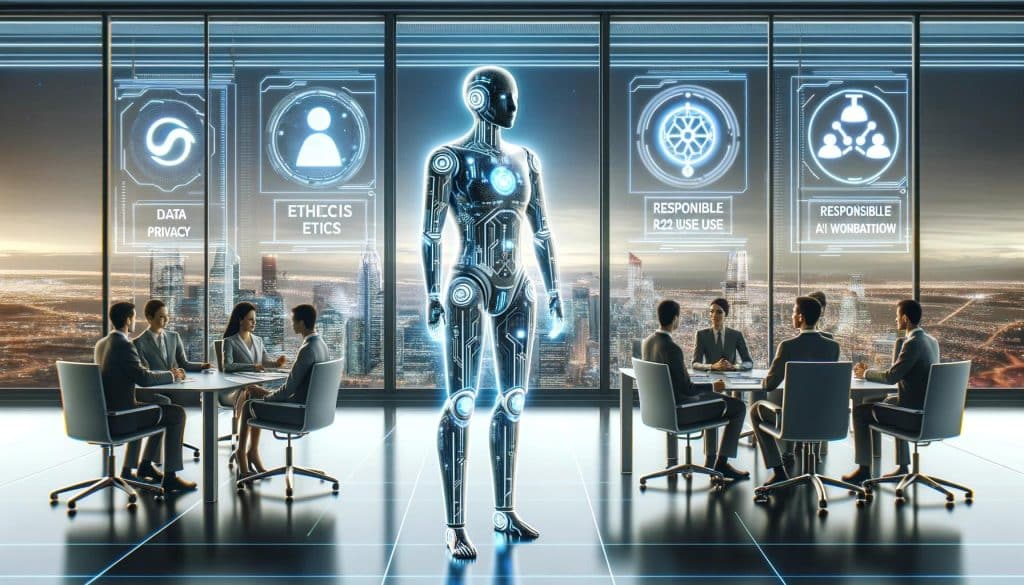Artificial Intelligence (AI) is transforming industries all over the world, creating efficiency, productivity, and improved decision-making. However, with increasing applications, risks also accompany misuse. The article will go through the dynamic interplay between AI and cybersecurity, focusing on the challenges, emerging risks, opportunities, and the impact of AI on cybersecurity in securing modern businesses.

New AI Risks in Cybersecurity
As AI technology rapidly evolves, businesses are facing a fever pitch of cybersecurity concerns. The global AI industry is expected to grow from $88 billion in 2022 to $411 billion by 2027. Consequently, the threat landscape changes dynamically. Companies Face New AI Risks, Cybersecurity Issues states that AI technology empowers cybercriminals with malicious social engineering tactics, such as malware, ransomware, or phishing. These tactics are designed to lure targets into handing over sensitive information.
Moreover, AI’s rapid processing speed enables cybercriminals to exploit a massive amount of data in network assets. This speed exposes vulnerabilities in IT infrastructures. The emergence of large language models (LLMs) and generative AI adds to the complexity. As AI-generated malware evolves, the window between security updates and hackers exploiting unpatched software narrows, intensifying the race to secure businesses.
Challenges and Proactive Measures
Businesses face complex challenges when it comes to mitigating these AI-driven threats. Advanced solutions are needed to detect phishing emails, combat social engineering, and safeguard IT infrastructures. The following measures can help mitigate these challenges:
- AI-Driven Threat Detection: The application of AI for real-time threat detection and response enables businesses to identify unusual patterns or anomalies before they escalate into breaches.
- Training Employees: In the foregoing, regular cybersecurity training programs ensure that the employees realize and respond to phishing attempts and social engineering schemes.
- Continuous Monitoring: Partnering with Managed Security Service Providers (MSSPs) ensures 24/7 monitoring of network activities for potential vulnerabilities.
- Encrypting sensitive business data minimizes the damage caused by unauthorized access.
Enhancing Cybersecurity with AI Developments in Robotics
Advances in AI in robotics open new frontiers in cybersecurity. Researchers apply methods like ECoT to improve decision-making capabilities in robots, which have structured reasoning about complex tasks and, hopefully, can be transferred into insights applicable to cybersecurity.
For instance:
- Vision-Language-Action Models (VLAs). These train robots to integrate visual, linguistic, and actionable data. In cybersecurity, similar models can enhance the threat detection of systems by analyzing a combination of visual cues, like suspicious login attempts, and textual data, like phishing e-mails.
- Adaptive Learning: The robots that refine their reasoning through feedback parallel another variant, adaptive cybersecurity systems that learn from past breaches to enhance response to future threats.
Implications for Security
The integration of structured reasoning from robotics into cybersecurity offers potential breakthroughs. Businesses could implement AI systems capable of methodically analyzing threats and simulating potential attack scenarios. By leveraging such capabilities, organizations can anticipate cybercriminals’ next moves and develop robust defenses.
However, there are still challenges. Translating robotics-focused AI reasoning into cybersecurity applications requires a lot of research and development. Scalability and real-time application are critical factors that need to be addressed for these innovations to become mainstream.
The Role of Regulation and Ethics
AI-driven cybersecurity innovations bring some regulatory and ethical challenges to policymakers. Policymakers should establish guidelines to make sure that AI applications focus more on privacy and data protection. Businesses should also take heed of ethical AI practices to avoid unintended consequences, such as biased threat detection systems or overreliance on automated solutions.
Key Advantages of AI in Cybersecurity
While the risks are obvious, AI does provide many advantages in bolstering cybersecurity:
- Predictive Analytics: AI can analyze past data to predict future threats, which enables businesses to proactively secure their networks.
- Automated Threat Response: Reduction of response time: This reduces the amplitude of the attack.
- Enhanced Accuracy: Machine learning improves with time, avoiding false positives in threat detection.
- Cost Efficiency: AI-driven systems can reduce operational costs through streamlining security processes.
The Importance of AI in Modern Cybersecurity
AI is becoming the linchpin of modern cybersecurity strategies. The sheer volume and sophistication of cyberattacks make manual monitoring and response infeasible. AI bridges this gap by:
- Improving Decision-Making: AI systems analyze vast amounts of data to identify and prioritize threats based on their severity.
- Scaling Security Operations: AI automates routine tasks like log analysis, freeing up human experts to focus on complex issues.
- Providing contextual insights: Advanced machine learning algorithms allow it to explain and understand the “why” and “how” of the threats, enabling businesses to take targeted countermeasures.
AI-Powered Tools in Cybersecurity
Many AI-based security tools are being designed to improve cybersecurity.
- IDS: IDS is an AI-enabled system that tracks network traffic to identify potential threats.
- Endpoint Protection: AI solutions protect endpoint devices like laptops and smartphones using controls for detecting malware and unauthorized access.
- Threat Intelligence Platforms TIPs aggregate and analyze data from various sources to produce actionable intelligence for cybersecurity teams.
Preparing for the Future of AI in Cybersecurity
Organizations can gear themselves up to the changing AI-cybersecurity landscape by:
- AI Research Investment: Keeping pace with the newest AI developments gives businesses an edge in the market.
- Building Resilience: Rich security frameworks, such as zero trust, ensure lessen the effects of a breach.
- Educating the employees and stakeholders about AI-related risks and opportunities will promote awareness, thereby enhancing the overall security posture.
Future Trends in AI and Cybersecurity
Several themes are expected to influence the future of AI and cybersecurity:
- AI-Powered Sharing of Threat Intelligence: AI will be used via collaborative platforms to exchange real-time threat intelligence among various businesses.
- Zero Trust Architecture: AI will be essential to putting zero trust security frameworks into place, making sure that no external or internal entity is taken for granted.
- Quantum Computing: Although conventional encryption approaches are threatened by quantum computing, artificial intelligence is being investigated to provide encryption systems that are immune to quantum errors.
- Behavioral Biometrics: To identify unwanted access, AI systems will increasingly examine user behaviors, such as typing patterns and mouse movements.
AI Role in Bridging Growing Cybersecurity Skill Gap
The advancement in cyberattacks is ahead of the rate at which cybersecurity experts are becoming sophisticated. The gap of cybersecurity professionals in the global market has reached over four million, putting businesses at risk. AI helps fill this gap by automating routine tasks and providing intelligent tools that even less experienced professionals can use effectively.
For instance, AI-based systems can rapidly detect malware signatures, thus liberating human analysts to make more strategic decision-making. The AI-driven cybersecurity platform may also give step-by-step guidance to IT teams to help them mitigate risks without needing much expertise.
Conclusion: Navigating AI-Enhanced Cybersecurity
In summary, the integration of AI into cybersecurity poses new challenges but also offers robust solutions. Businesses must adopt proactive measures to manage the increased risk. Additionally, advancements in AI, like ECoT in robotics, show potential for enhancing cybersecurity strategies. Therefore, staying ahead in the cybersecurity race involves not just recognizing the threats but also leveraging innovative AI solutions effectively.
For more in-depth information, please refer to the articles: Companies Face New AI Risks, Cybersecurity Issues, and New AI Technique Let Robots “Think” Before They Perform Complex Tasks.
FAQs
1. How do businesses defend themselves from AI-generated cyber threats?
Businesses can employ AI-based threat detection systems, install complex encryption protocols, and ensure constant employee training to mitigate AI-generated threats.
2. What is the role of AI in predictive cybersecurity?
AI examines previous patterns of attacks to predict future attacks, allowing for a proactive defensive strategy.
3. Do ethics exist when using AI in cybersecurity?
Yes, ethical issues include violation of privacy, biased threat detection, and overreliance on automated systems. Addressing these requires transparency concerning ethical AI guidelines.
4. How does robotics research impact cybersecurity?
Research in robotics, for instance, Embodied Chain-of-Thought Reasoning, may help in structured problem-solving in cybersecurity threat analysis.
5. What is zero trust in AI cybersecurity?
Zero trust certainly ensures that nobody is trusted by default so that insider threats and unauthorized access are reduced. AI becomes a very crucial concept in implementing zero trust.



